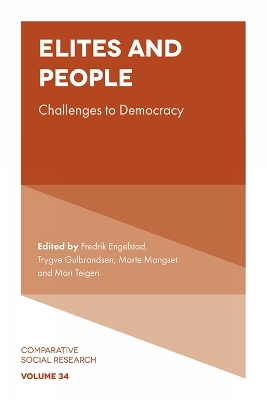
Elites and People
Emerald Publishing Limited (Verlag)
978-1-83867-916-3 (ISBN)
This volume contains an Open Access chapter.
Relationships between elites and democracy have always been strained. The very concept of elites - of 'chosen people' - stands in contradiction to democratic ideals of political equality. Simultaneously, they are necessary parts of democratic societies. In any large-scale society, democracy is unthinkable without large organizations, be they political bodies, bureaucracies, enterprises, or voluntary organizations. When power is concentrated at the summit of such organizations the incumbents of the top positions potentially constitute groups that often are termed elite groups.
The present volume of Comparative Social Research offers a broad set of comparative studies of elites, stretching from the Arab Spring in Tunisia and Egypt to women's political leadership in Brazil and Germany, via attainment of elite positions among minorities in France and the US.
The quality of democratic governance seems to be in decline in many parts of contemporary world. Nevertheless, political elections are still a main source of legitimacy, even when they are far from being free and fair. Developments in the Third Wave democracies established around 1990 both in Europe and in the rest of the world, are treated in several chapters. How do they fare two or three decades later? Another group of chapters sets the focus on elite recruitment and socialization, spelled out against class and gender. The volume concludes by highlighting various entanglements of elites with populism, concerning both underlying reasons for the recent populist expansion and the various images of elites in populist movements.
Fredrik Engelstad is Professor (em) in Sociology at the University of Oslo. Trygve Gulbrandsen is Research Professor (em) at Institute of Social Research and formerly Adjunct Professor in Sociology at University of Oslo. Marte Mangset is a Senior Research Fellow at the Institute for Social Research, Oslo, Norway. Mari Teigen is Research Professor at Institute for Social Research, Oslo, Norway.
Introduction: Elites and People: Challenges to Democracy; Fredrik Engelstad, Trygve Gulbrandsen, Marte Mangset, and Mari Teigen PART I: POLITICAL ELITES AND POPULATIONS
1. Elites Survival and the Arab Spring: The Cases of Tunisia and Egypt; Stig Stenslie and Kjetil Selvik
2. The Development of Political Legitimacy among MPs and Citizens in Old and Young Democracies; Ursula Hoffmann-Lange
3. Unraveling Unchanged Supranational Commitment of National Political Elites during the Eurozone Crisis; Borbála Gӧncz
4. The Political Elite and Trust in EU Institutions after the Crisis. A Comparative Analysis of the Hungarian Case; György Lengyel and Laura Szabó
PART II: ELITE RECRUITMENT AND MOBILITY
5. The (Re-)Production of Elites in Private and Public Boarding Schools: Comparative Perspectives on Elite Education in Germany; Anja Gibson
6. The Class Identity Negotiations of Upwardly Mobile Individuals amongst Whites and the Racial Other: A US-French Comparison; Jules Naudet and Shirin Shahrokni
7. Women Executives: Empowering Women through Selection in Germany and Brazil; Farida Jalalzai
PART III: ELITES AND POPULISM
8. Elites, Insecurity, and Populists in Western Democracies; John Higley
9. The Populist Elite Paradox: Using Elite Theory to Elucidate the Shapes and Stakes of Populist Elite Critiques; Marte Mangset, Fredrik Engelstad, Mari Teigen, and Trygve Gulbrandsen - OPEN ACCESS CHAPTER
| Erscheinungsdatum | 07.10.2019 |
|---|---|
| Reihe/Serie | Comparative Social Research |
| Verlagsort | Bingley |
| Sprache | englisch |
| Maße | 152 x 229 mm |
| Gewicht | 518 g |
| Themenwelt | Sozialwissenschaften ► Soziologie ► Makrosoziologie |
| Sozialwissenschaften ► Soziologie ► Mikrosoziologie | |
| ISBN-10 | 1-83867-916-2 / 1838679162 |
| ISBN-13 | 978-1-83867-916-3 / 9781838679163 |
| Zustand | Neuware |
| Haben Sie eine Frage zum Produkt? |
aus dem Bereich


